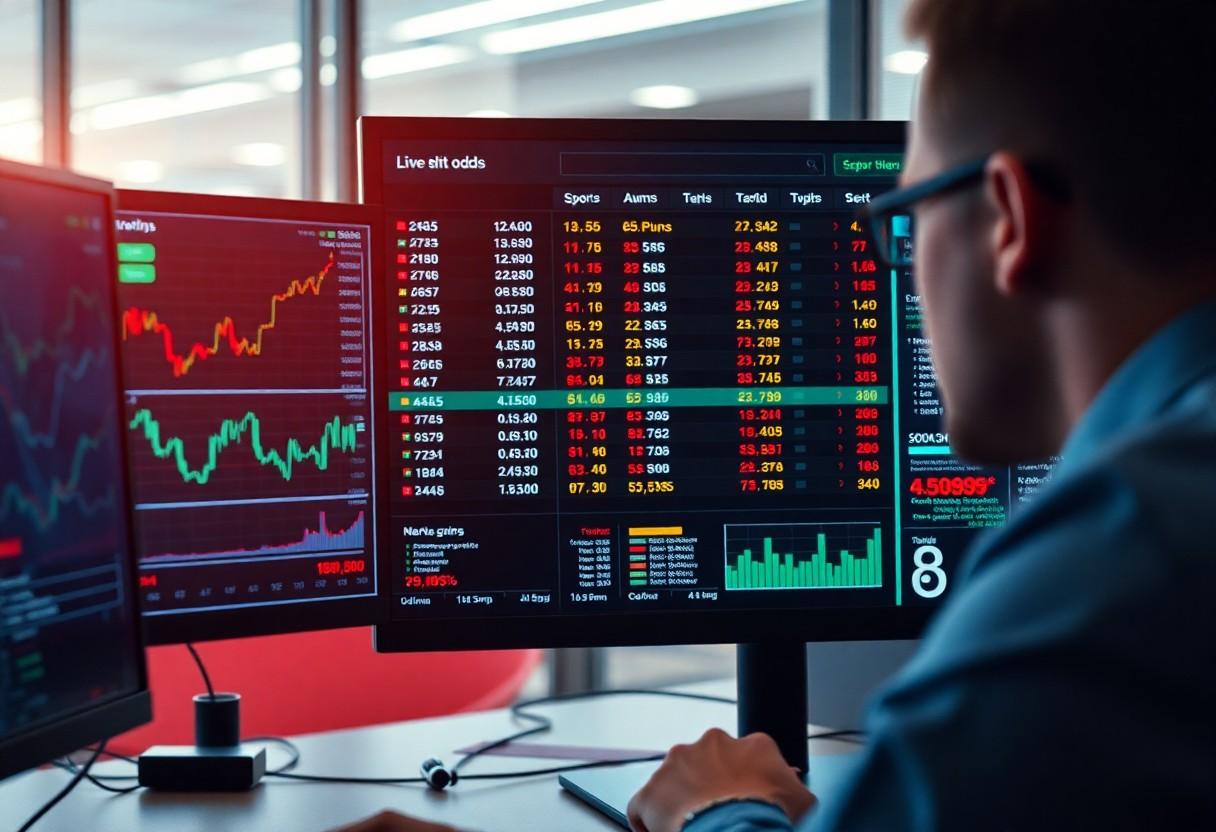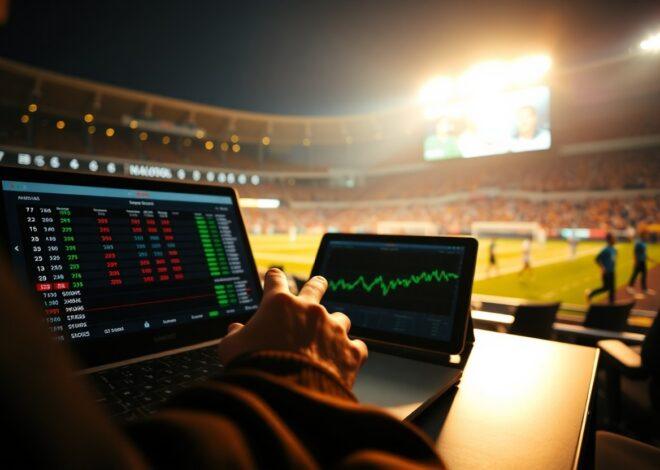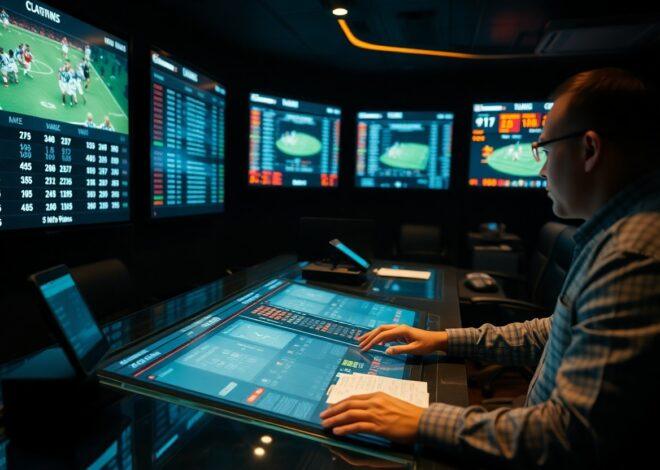
The Role Of Data And Algorithms In Shaping Live Betting Odds
You will discover how data and algorithms revolutionize the live betting landscape. These technologies analyze extensive datasets in real-time to update odds based on player performance, game dynamics, and even societal factors. This not only enhances the betting experience but also introduces potential risks, as flawed algorithms can lead to inaccurate odds. Understanding this relationship is vital for bettors, as it enables them to make informed decisions while navigating the complexities of live betting.
Understanding Live Betting
Live betting, also known as in-play betting, allows punters to place wagers on events as they unfold in real-time. This dynamic environment demands constant updates to odds, reflecting the current status of the game or match. The rapid pace of live betting enhances the excitement for bettors, as they can seize opportunities based on real-time developments, leading to more strategic wagering and engagement during events.
Definition and Mechanics
Live betting involves updating odds based on ongoing actions within a sports event, such as goals, fouls, or other pivotal moments. A dedicated betting platform tracks these developments, adjusting odds within seconds to reflect the evolving probabilities of outcomes. Algorithms analyze vast data points, ensuring odds are continuously optimized to balance risk for bookmakers and potential rewards for bettors.
Overview of Betting Markets
The variety of betting markets available during live betting substantially enhances the wagering experience. Markets can include traditional outcomes such as match winner or total goals, alongside unique propositions like next team to score or specific player performance metrics. This plethora of choices caters to diverse bettor interests and strategies.
Within live betting, markets can rapidly shift based on game dynamics. For instance, if a team scores, the odds for that team to win typically decrease significantly while the opposing team’s odds rise. Additionally, specialized markets are often created around unique events, such as a player receiving a yellow card or scoring a goal, encouraging bettors with varying interests to engage actively. The flexibility offered allows seasoned bettors to leverage real-time insights, while novice bettors can explore numerous opportunities to find their niche.
The Science Behind Odds
Odds are not simply arbitrary numbers; they are derived from complex algorithms that leverage various data inputs to reflect the true probability of outcomes. Advanced statistical techniques assess past performances, player statistics, and environmental factors, ensuring that odds accurately represent potential results. Each adjustment in real-time shifts these odds, providing a dynamic betting experience tailored to current conditions.
Statistical Models and Predictions
Statistical models form the backbone of odds calculation, employing regression analysis and machine learning algorithms to predict outcomes based on historical data. These models analyze vast amounts of information, incorporating player form, injury reports, and team dynamics to enhance predictive accuracy. A model that can effectively integrate these factors offers more reliable odds, ultimately guiding bettors in their decisions.
The Impact of Real-time Data
Real-time data greatly influences live betting odds by allowing bookmakers to adjust them instantly based on game events and performances. Factors such as player injuries, weather changes, and crowd sentiment can shift probabilities dramatically, necessitating rapid updates to maintain accuracy.
For instance, during a football match, if a key player sustains an injury, the odds may fluctuate significantly within seconds. Some platforms even employ live tracking technology to assess player performance analytics and make adjustments on the fly. This immediacy ensures that bettors receive the most current information, reflecting the latest developments in the game. As a result, the betting landscape is more dynamic and responsive, fostering an engaging experience for participants while also challenging those who do not closely monitor ongoing events.
Algorithms in Sports Betting
Algorithms play a pivotal role in shaping the dynamic landscape of sports betting. They utilize large datasets to analyze past performance, player statistics, and betting patterns, which allows bookmakers to adjust odds in real time. This ensures that odds reflect the changing dynamics of a game, enhancing the betting experience for users.
Types of Algorithms Used
Various algorithms are implemented in sports betting, each serving distinct purposes:
- Statistical Algorithms: Focus on historical data analysis.
- Predictive Algorithms: Forecast future events based on patterns.
- Event-Driven Algorithms: Adjust odds based on real-time game occurrences.
- Machine Learning Algorithms: Use AI to improve data interpretation.
- Sentiment Analysis Algorithms: Incorporate public sentiment and social media trends.
After analyzing these algorithms, it’s evident that they collectively enhance the accuracy and responsiveness of live betting odds.
| Algorithm Type | Function |
| Statistical Algorithms | Analyze historical data |
| Predictive Algorithms | Forecast based on patterns |
| Event-Driven Algorithms | Adjust based on events |
| Machine Learning Algorithms | Enhance data analysis |
| Sentiment Analysis | Gauge public opinion |
Machine Learning and Its Applications
Machine learning is transforming sports betting by providing sophisticated models that adapt to new information rapidly. These systems analyze vast amounts of data, including player performance metrics, weather conditions, and historical outcomes, to refine predictions continuously.
Applications of machine learning in sports betting include real-time odds modeling and risk assessment. By processing data from various sources, these algorithms can identify patterns that humans may overlook. For instance, a machine learning model could predict a team’s performance better than traditional methods by incorporating player fatigue levels, last-minute changes, and even sentiment analysis from social media. As these algorithms learn from ongoing betting data, they become more precise, offering a competitive edge to both bookmakers and bettors.
Data Sources for Betting Odds
Data for live betting odds derives from various sources, each contributing unique insights that inform the odds-making process. These sources include statistical databases, sports news websites, and live feeds from matches, ensuring real-time updates crucial for accuracy. Live data integration is necessary, allowing betting platforms to adapt odds dynamically based on unfolding events.
Types of Data Collected
Betting odds are informed by multiple data categories that encompass both quantitative and qualitative insights. Key data types include:
- Player statistics: Analyzing individual performance metrics.
- Team history: Examining past performance in various conditions.
- In-game events: Monitoring injuries and key plays during matches.
- Weather conditions: Assessing environmental impacts on gameplay.
- Public sentiment: Gauging betting trends and crowd dynamics.
This comprehensive data collection enables betting algorithms to adjust odds in real time, reflecting the most accurate probabilities for outcomes.
Data Integrity and Accuracy
The validity of betting odds relies heavily on the integrity and accuracy of the data sources employed. Any inconsistencies or inaccuracies can lead to erroneous odds, impacting betting outcomes significantly.
Assured data integrity is vital for maintaining trust within the betting community. Notable examples include the use of encrypted feeds and real-time monitoring tools to safeguard data from corruption or manipulation. Advanced statistical methods are employed to validate incoming data against historical trends, ensuring that operators can provide reliable information. Continuous audits and checks further bolster data quality, fostering a betting environment rooted in transparency and fairness. The impact of accurate data reaches beyond odds; it influences strategic decision-making for both bettors and bookmakers alike.
Challenges in Live Betting Odds
Live betting odds face numerous challenges that can lead to rapid changes and unpredictability. The fast pace of game events, coupled with real-time data processing, necessitates meticulous algorithmic adjustments. Factors such as player injuries, sudden momentum shifts, and weather conditions can drastically influence odds, often leaving bookmakers scrambling to keep up.
Factors Influencing Odds Changes
Several elements contribute to the fluctuation of live betting odds.
- Injuries
- Team performance
- Weather conditions
- Fan sentiment
- Game momentum
Any shift in these factors can lead to immediate revisions in betting odds, reflecting the dynamic nature of live sports.
Risks and Limitations of Algorithms
While algorithms enhance the efficiency of betting odds, they are not without risks. Miscalculations can occur if input data is incorrect or if the algorithms fail to adapt to sudden changes in game dynamics. Additionally, a reliance on historical data may overlook current team dynamics or player conditions, leading to a misrepresentation of true probabilities.
For example, during a live match, if an unexpected event occurs—such as a key player sustaining an injury—algorithms may not instantaneously process this change, resulting in outdated odds. Furthermore, ethical considerations arise regarding the potential for algorithmic biases, where past performance may skew future predictions. Algorithms also struggle to account for non-quantifiable factors, such as player morale or psychological pressure. In essence, while data and algorithms significantly enhance live betting, they are inherently limited by their reliance on available data and their capacity for adaptation in real-time situations.
Future Trends in Live Betting
Anticipating future trends in live betting reveals a landscape poised for transformation through advanced technology, enhanced consumer engagement, and regulatory changes. As the industry adapts to the increasing demand for real-time information and user-friendly experiences, innovations will shape how bettors interact with platforms, further blurring the lines between traditional and modern gambling practices.
Innovations in Data and Technology
Rapid advancements in artificial intelligence and machine learning are set to enhance live betting experiences. These technologies will enable bookmakers to process vast amounts of data instantly, adjusting odds with unprecedented accuracy. Additionally, the integration of blockchain technology is expected to increase transparency and security, fostering consumer trust while streamlining payment processes.
Evolving Consumer Behavior
Changing consumer preferences are driving a significant shift in live betting strategies. Bettors now seek more interactive and personalized experiences, with an increased focus on mobile platforms and in-play betting options. This evolution reflects a growing demand for instant gratification and real-time engagement, pushing operators to adapt their offerings and improve user interfaces to retain competitive advantage.
Millennials and Gen Z are leading this trend, gravitating toward platforms that offer social betting experiences and gamification features. Reports indicate that over 40% of young consumers prefer apps that allow them to engage with friends while placing bets, highlighting a pivotal shift toward community-oriented experiences. As these demographics continue to dominate the betting landscape, traditional operators must evolve to meet these expectations or risk losing market share to more agile competitors that prioritize consumer engagement and satisfaction.
Summing up
As a reminder, the integration of data and algorithms in live betting odds is transformative, enabling bookmakers to assess real-time game conditions and adjust odds instantaneously. By analyzing player statistics, historical performances, and ongoing game analytics, algorithms enhance betting accuracy and efficiency. This sophisticated approach not only influences betting patterns but also ensures a competitive landscape in the sports wagering industry, catering to informed bettors and promoting engagement. Ultimately, the interplay of data-driven insights and algorithmic sophistication facilitates a dynamic betting environment that significantly shapes the odds presented to users.
FAQ
Q: How do data and algorithms influence live betting odds?
A: Data and algorithms analyze real-time information such as player performance, weather conditions, and game statistics to adjust betting odds dynamically. This ensures that odds reflect the most current situation in a match, enabling bookmakers to manage risk and respond to betting patterns effectively.
Q: What types of data are utilized in live betting odds adjustment?
A: Data used in live betting includes historical performance data, in-game statistics, player injuries, weather forecasts, and betting market trends. These data points are processed continuously to provide accurate odds that represent the unfolding event.
Q: How do algorithms help in detecting betting patterns during live events?
A: Algorithms analyze betting patterns by monitoring the volume and types of bets placed in real-time. They can identify sudden changes in betting behavior, which may indicate insider knowledge or shifting perceptions about the outcome, allowing bookmakers to react and adjust odds accordingly.



